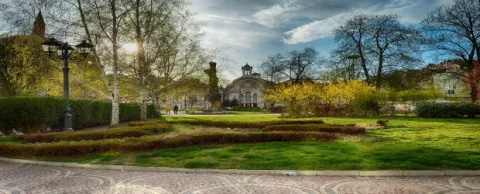
Bulgaria’s capital city of Sofia is home to 1.3 million citizens and contributes about 30 percent to the national GDP. As the country’s largest city continues to grow, it’s looking to achieve the title of “green capital” and become a model of sustainable development. As part of the Sustainable Energy Action Plan 2012-2020, Sofia is laying down a series of steps to help with everything from energy management to transport and waste management—and looking to technologies from around the globe to aid the process. Here’s how Sofia is transforming its smart city vision into reality.-Bruno De Man
Digital developments
Over the past decade, Bulgaria as a whole has served as a model of urban infrastructure transformation thanks to the help of EU and national funds, which Bulgarian Member of European Parliament Eva Maydell says “are a catalyst for smart cities to thrive.” In addition to the funding opportunities, she adds that “these developments are also very much due to public-private initiatives that make smart cities happen.” For a city to achieve smart status, both the local leadership and the citizens themselves must be on board and open to change, embracing new developments in a city, such as the digitalization of urban infrastructure. This is one sector that Sofia is looking to spearhead, using smart projects in Amsterdam and Barcelona as guiding examples. “We know that electronics and information technology are the basis of the third revolution; they helped to automate a number of industries and facilitated communication worldwide,” said Sofia’s mayor, Yordanka Fandakova, in a speech at the WEBIT Digital Festival, attended by 6,000 people from 110 countries. “Now we are in the initial stage of a follow-up process that merges and connects a variety of technologies, infrastructures, and objects.”
For Sofia, the key to developing a strong digital infrastructure is by learning from—and working with—European partners. One example of how Sofia is achieving this goal is with the implementation of the Sustainable Urban Mobility Plan, incorporating leading technologies and practices from Vienna, Munich, and Lyon to develop its own mobility strategies by modernizing transport, introducing an electric toll system for public transport, and constructing new infrastructure. Local start-ups are also developing innovative new apps, while hackathons are inspiring ideas from forest fire prevention applications to job-finding platforms. It’s this type of community support, and forward-thinking leadership, that’s helping establish Sofia as an up-and-coming smart city on par with some of the most modern capitals across Europe. “Together we make Sofia one of the most rapidly developing capitals, attracting more and more people from all over the world,” Fandakova said. “I strongly believe in the potential of the city, its citizens, and the hard work that is needed to make it a better place to live.”



